Coursera vs UDemy – Which one is actually better?
Both offer various courses, but their approaches and target audiences differ significantly.
This comparison will help you navigate each platform’s features, strengths, and weaknesses, enabling you to decide which one best suits your learning needs and goals.
So, without further ado, let us get into it!
Coursera vs Udemy: Which Is Better?
Coursera offers structured courses and accredited certificates with academia-focused content from top universities, while Udemy provides a broader range of practical skills taught by expert instructors.
Coursera vs Udemy: Quick Comparison
Before we delve into the detailed comparison, let’s examine how Coursera and Udemy compare in key areas:
| Feature | Coursera | Udemy |
|---|---|---|
| Free Trial | 7 day | Customized Free Trial |
| Money Back Guarantee | 14 Days | 30 Days |
| Number of Courses | 7,000+ | 11,000+ |
| Free Courses | ✅ | ✅ |
| Degree Programs | ✅ | ❌ |
| Corporate Solutions | ✅ | ✅ |
| Pricing Model | Subscription or pay-per-course | Subscription or pay-per-course |
| Target Audience | Academic and professional learners | Diverse learners, including hobbyists |
| Course Quality | Consistent, peer-reviewed | Varies, instructor-dependent |
Coursera vs Udemy: Detailed Comparison
Let us begin with the comprehensive comparison, which will examine various aspects, including course offerings, instructor quality, pricing, and user experience.
Course Offerings And Variety
Coursera offers over 7,000 structured courses from 325+ universities, focusing on STEM, business, data science, and technology. Courses are often part of larger specializations or degree programs.

Udemy offers 11,000+ courses on various topics, including professional skills, hobbies, and personal development. It focuses on practical, skill-based learning in programming, design, and marketing.

Course Structure And Quality
Coursera offers structured courses with weekly modules, assignments, and peer-reviewed projects. Courses typically run for 4-12 weeks with set start dates, including quizzes, exams, and graded assignments.
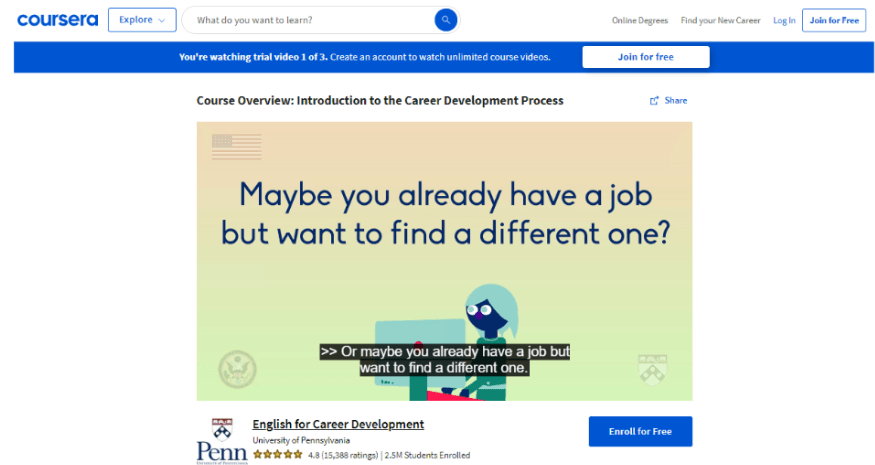
Udemy offers self-paced courses with no deadlines, varying in quality based on instructors. It features video lectures, quizzes, and practical exercises on skill-based learning. Enrollees get lifetime access to course materials.
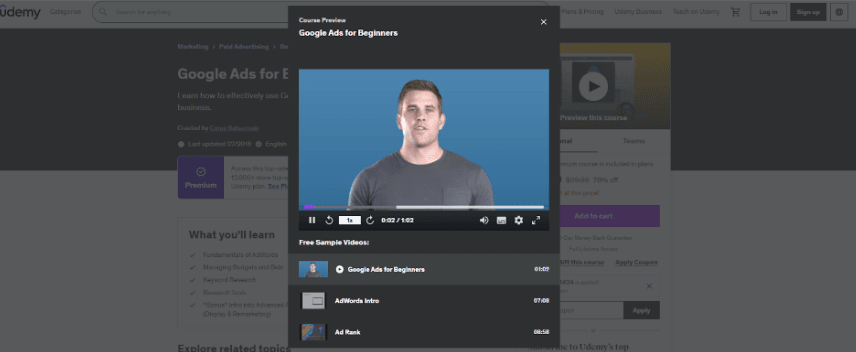
Instructor Expertise And Selection
Coursera features professors from top universities and industry experts, with a rigorous vetting process focused on academic credentials. Courses emphasize cutting-edge research and insights, though interaction with instructors is limited, often supplemented by teaching assistants for support.

Udemy allows anyone with expertise to teach, resulting in a wide range of instructors, from professionals to hobbyists. Teaching experience varies, but many are active practitioners. Learners often enjoy more direct interaction through Q&A forums and messaging.
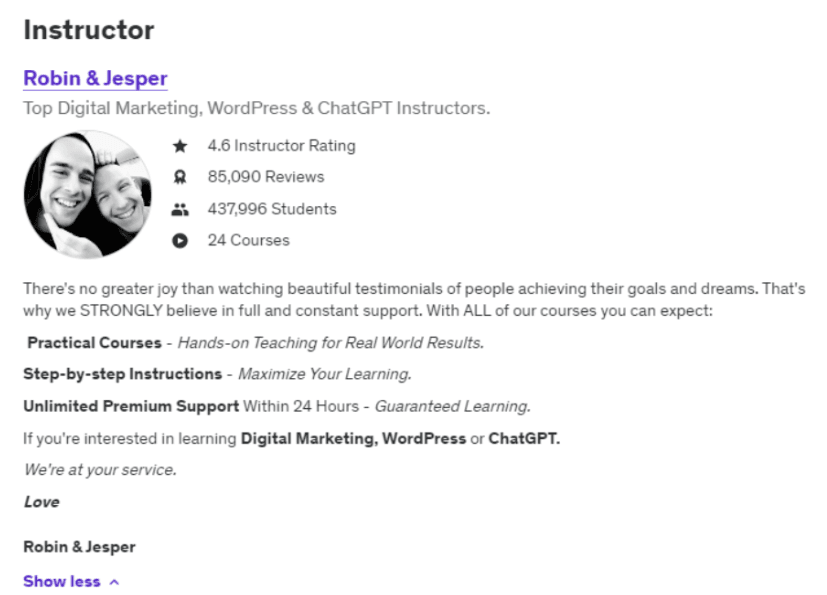
Certifications And Accreditation
Coursera offers accredited certificates from top universities, including Course, Specialization, Professional, and MasterTrack Certificates, as well as full degrees, often recognized by employers and shareable on LinkedIn.
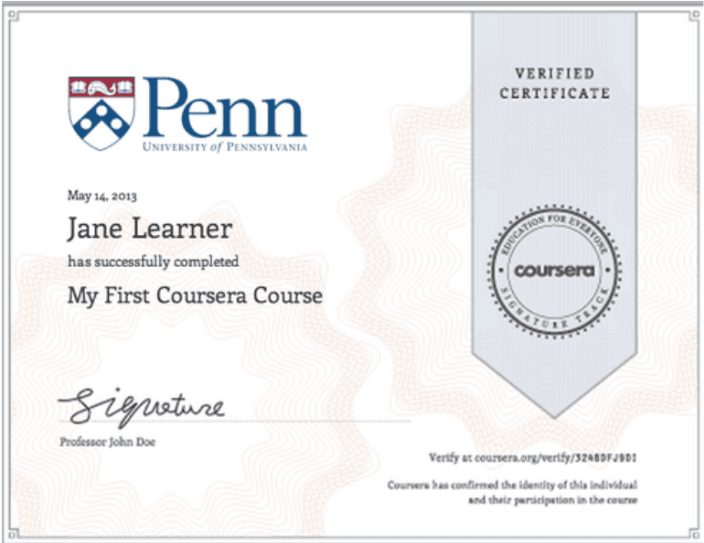
Udemy provides certificates of completion for paid courses, but they are not accredited. While useful for personal achievement, their value depends on the instructor’s reputation and relevance to specific industries. Udemy does not offer degrees or college credits.

Pricing Models And Affordability
Individual courses on Coursera cost between $29 and $99, specializations are subscription-based ($39-$79/month), and Coursera Plus offers yearly access for $399/ year. Degree programs range from $15,000 to $25,000, and financial aid is available.
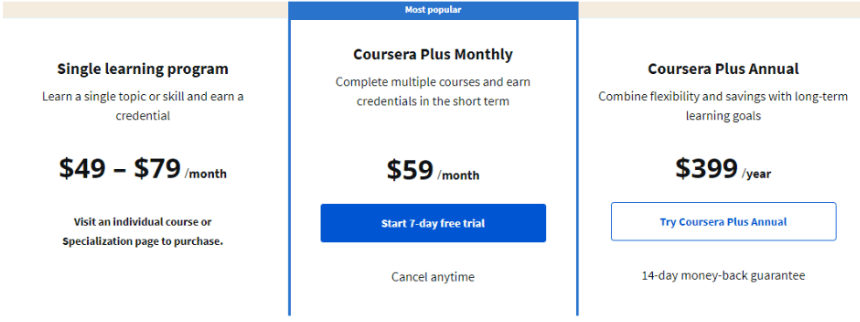
Note: If you find Coursera Pricing confusing, read my detailed, easy breakdown of Coursera Pricing.
Udemy offers a pay-per-course mode and subscriptions, with prices ranging from $19.99 to $199.99, often discounted to $9.99-$14.99. It provides a few free courses and lifetime access to purchases. Udemy also offers a subscription-based plan ($20/ month).
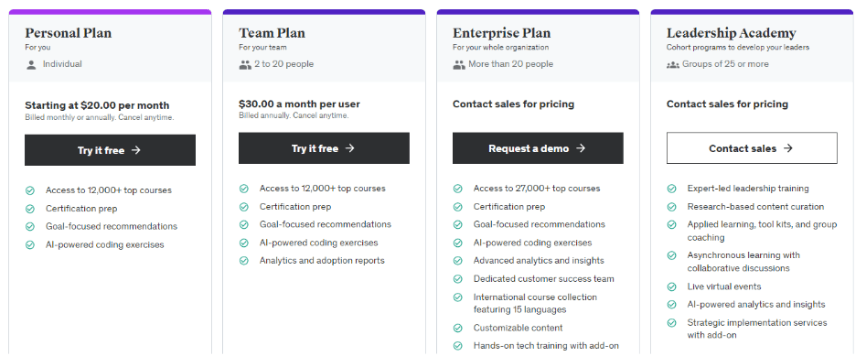
Get Coursera Plus for $1 here.
User Interface And Learning Experience
Coursera features a clean interface, organized courses, progress tracking, interactive video lectures, quizzes, peer-reviewed assignments, and discussion forums. It is also supported by a mobile app for on-the-go learning.
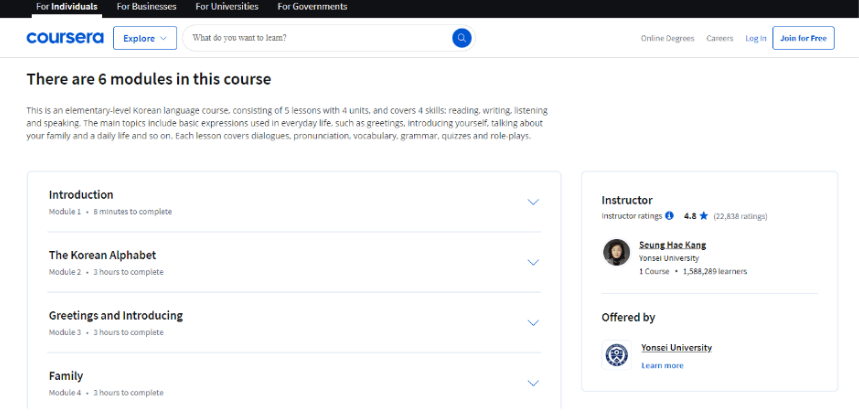
Udemy has an intuitive marketplace interface for easy browsing, adjustable video playback, downloadable resources, Q&A sections for instructor interaction, progress tracking, completion certificates, and a mobile app with offline viewing.

Mobile App And Offline Learning Capabilities
Coursera’s mobile app supports iOS and Android, allowing offline video downloads, progress syncing across devices, and offline access to quizzes and articles.
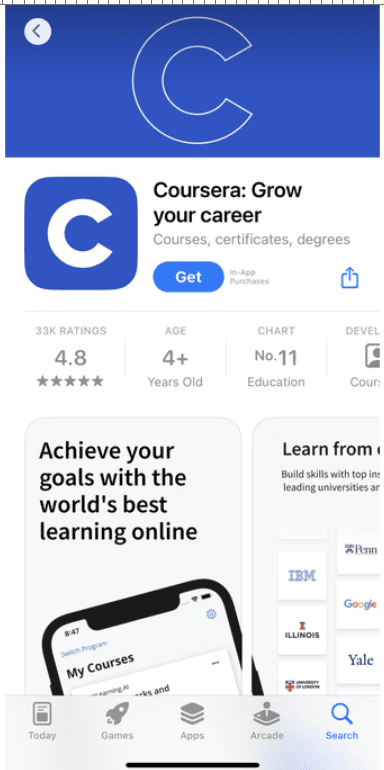
Udemy’s mobile app for iOS and Android allows users to download entire courses for offline viewing, sync progress between devices, complete quizzes offline, bookmark sections, and cast videos to a TV for larger viewing.

Free Course Availability
Coursera provides many courses that can be audited for free, including video lectures and reading materials. Free users face limitations on graded assignments and certificates. Some courses offer a 7-day free trial, and financial aid is available for many.
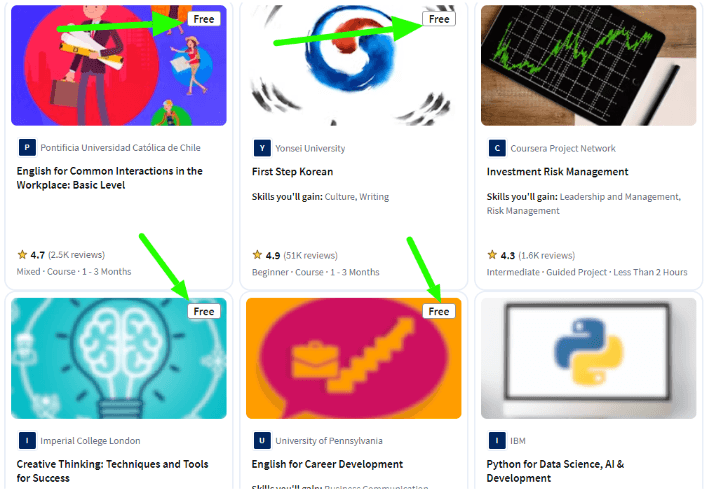
Udemy offers a range of free courses, often as introductions to paid options. Free courses have no feature limitations but are typically shorter.
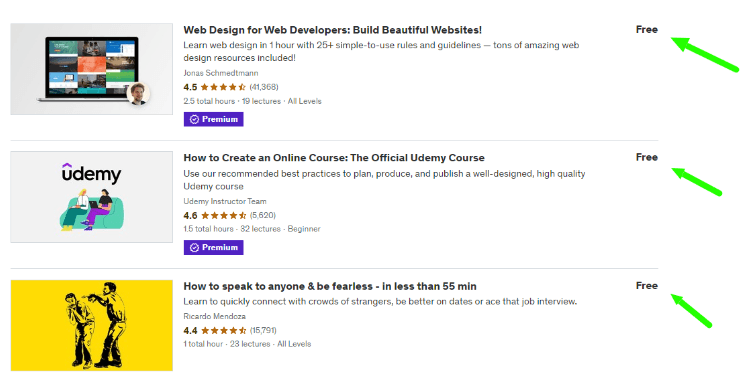
Corporate And Business Solutions
Coursera for Business offers tailored programs with access to the entire course catalog, including specializations and certificates. For smaller businesses, Coursera is available for teams of 5 to 125 employees to upskill.
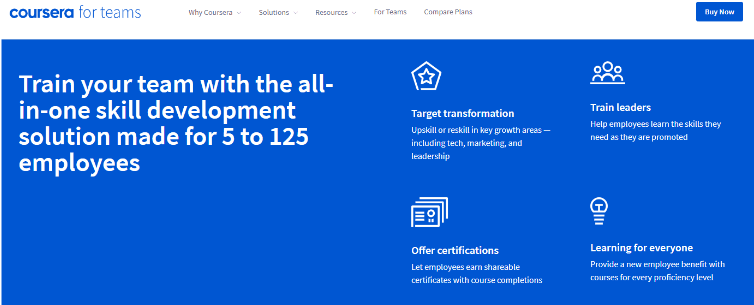
Udemy Business offers a comprehensive learning solution with curated business courses for 2100+ employees. Custom course creation tools, advanced reporting, SSO, API integrations, and a Team Plan for smaller groups and departments are also available.
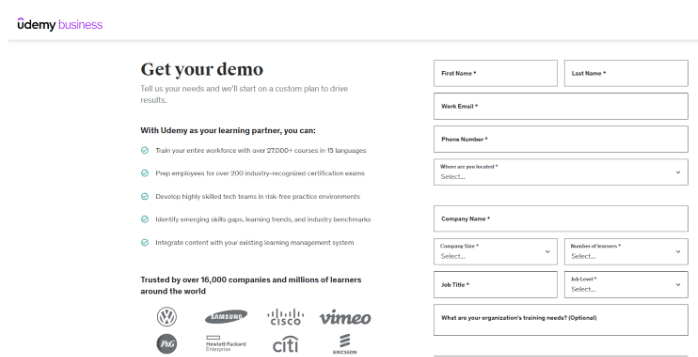
Recent Updates For Coursera And Udemy
Coursera continually expands its course offerings and has introduced a “choose your role” feature. This feature allows learners to select courses tailored to their niche, helping them build careers in their specific fields.

Udemy recently introduced a subscription model starting at $20, filling a previous gap in its offerings. Additionally, it’s upgraded its homepage for easier navigation and quicker access to its courses.

Coursera vs Udemy: Unique Selling Points
Coursera’s key strength is its partnerships with top universities and companies. These partners offer accredited online bachelor’s and master’s degrees.

Udemy’s strength is its vast catalog, covering diverse topics, from professional skills to hobbies. Lifetime access to purchased courses and frequent discounts make it ideal for budget-conscious learners seeking specific skills.

Coursera vs Udemy: User Reviews
On Trust Radius, Coursera is rated 8.5 out of 10. Now let us check out what people are saying about the platform:

On the other hand, Udemy has a score of 8.2 out of 10 on Trust Radius. Here are a few reviews that I found helpful:

Common Criticisms For Each Platform
Both Coursera and Udemy have their strengths, but they also face criticisms. Understanding these drawbacks will help you set realistic expectations. Let’s explore the key issues for each platform.
Let us begin with Coursera first:
- Strict deadlines and schedules can be challenging for working professionals
- Limited instructor interaction in many courses
- Some users find the peer-grading system in certain courses to be unreliable
Udemy, on the other hand, has the following common critics:
- Inconsistent course quality due to the open instructor model
- Lack of accreditation for certificates
- Frequent sales can devalue courses and frustrate full-price buyers
Which One is Worth Your Time and Investment?
After spending ample time on both platforms, I have concluded that Coursera is worth one’s time for the following reasons:
- Coursera provides top-tier education through partnerships with leading universities and expert instructors.
- Accredited certifications and structured learning paths enhance career prospects.
- Offers industry-relevant content and flexible learning options with financial aid available.
- Ideal for serious education seekers and a valuable investment in your future.
That being said, I would also like you to try each platform before committing to one. Because what may be a good fit for you depends on your personal learning goals, budget, and preferred learning style.
Coursera Is Best For?
Coursera is ideal for learners seeking a more structured, academic-oriented approach to online education.
This platform is particularly well-suited for:
- Individuals pursuing university-level courses and degrees.
- Professionals aiming for accredited certificates from renowned institutions.
- Learners who prefer a structured curriculum with deadlines and peer interaction.
- Those interested in specialized fields like data science and business analytics.
- Students and professionals looking to enhance their resumes with recognized qualifications.
If you plan to pick Coursera, get a huge Coursera Plus discount here.
Udemy Is Best For
Udemy shines as a versatile platform catering to various interests and skill levels. It’s particularly beneficial for:
- Self-paced learners who prefer flexible study schedules.
- Individuals seeking to acquire practical, hands-on skills quickly.
- Professionals looking to upskill or reskill in specific areas.
- Hobbyists and enthusiasts exploring diverse subjects.
- Budget-conscious learners seeking affordable or discounted courses.
If you are still looking for more options, you can read my comparison on Coursera vs Pluralsight or Coursera vs LinkedIn Learning.
Conclusion: Coursera Excels In Academic Rigor And Accredited Certifications
Coursera is ideal for those seeking university-level education or recognized qualifications. In contrast, Udemy offers vast course selection and flexibility for practical, skill-based learning across various interests.
For structured education and degree programs, Coursera is the clear choice due to its partnerships with top universities. However, for quick skill acquisition or exploring diverse topics at your own pace, Udemy’s extensive catalog and lifetime access are advantageous.
Ultimately, the best platform depends on your goals and learning style. So, which Online learning platform will you choose today?
FAQs
Coursera is better for structured, accredited education, while Udemy excels in practical, flexible learning. The choice depends on your specific learning goals and needs.
Employers generally prefer Coursera due to its accredited certifications and partnerships with reputable institutions that provide recognized qualifications.
Coursera certificates, especially those from accredited institutions, are taken seriously as they demonstrate a commitment to professional development and knowledge in specific fields.
Coursera certificates are worth it for career advancement, as employers recognize them and can enhance your resume with reputable qualifications.
Udemy certificates are typically less respected than those from accredited institutions like Coursera. While they demonstrate skills and knowledge, their lack of formal accreditation may limit employer recognition. However, they can still showcase practical skills in certain industries.
